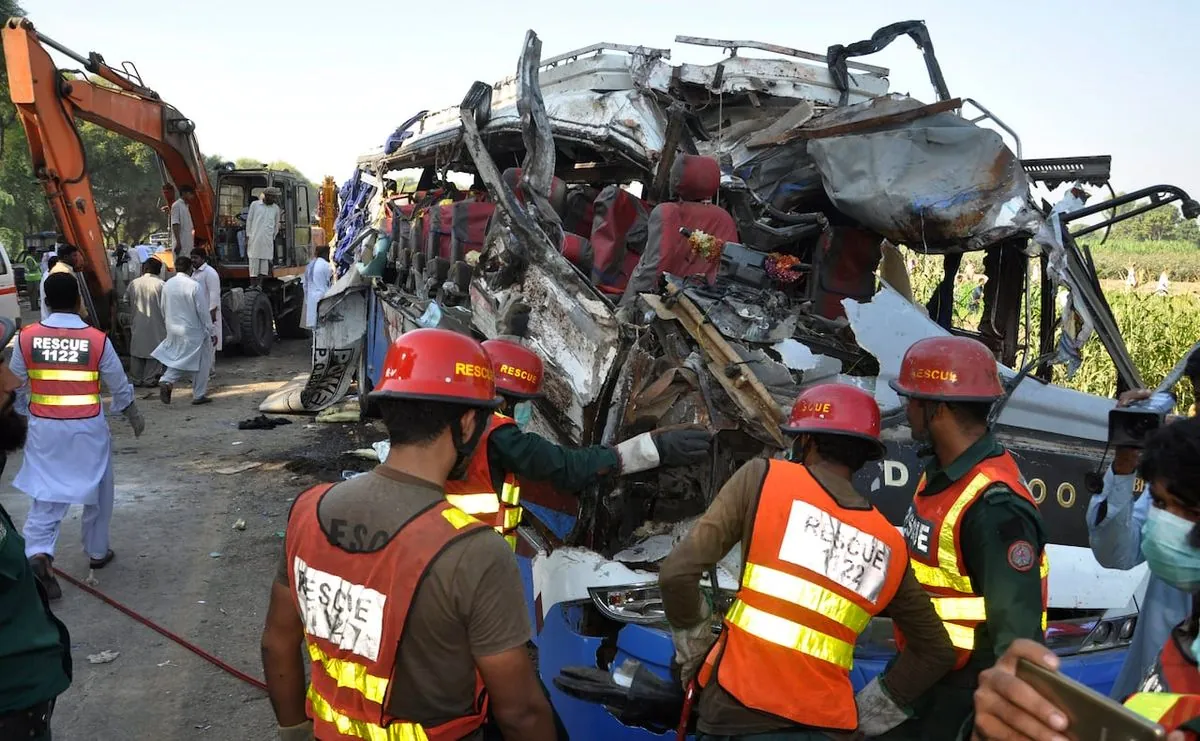Dual Bus Tragedies Claim 35 Lives in Pakistan's Baluchistan and Punjab
Two separate bus accidents in Pakistan's Baluchistan and Punjab provinces resulted in at least 35 fatalities and numerous injuries. The incidents highlight ongoing concerns about road safety in the country.

On August 25, 2024, Pakistan experienced two devastating bus accidents, resulting in a combined death toll of at least 35 individuals and leaving dozens more injured. These incidents have once again brought attention to the persistent issue of road safety in the world's fifth-most populous nation, home to over 241 million people.
The first accident occurred in the southwestern province of Baluchistan, Pakistan's largest by land area. A bus transporting Shiite Muslim pilgrims, who were returning from Iraq via Iran, plummeted into a ravine along the Makran Coastal Highway. This 653-kilometer road stretches along Pakistan's Arabian Sea coast. The local police chief, Qazi Sabir, reported that brake failure caused the driver to lose control of the vehicle. The crash claimed the lives of at least 12 passengers and left 32 others injured.

Hours later, a second bus accident took place in the Kahuta district of Punjab, Pakistan's most populous province. This incident resulted in 23 fatalities when the bus fell into another ravine. The dual tragedies have intensified concerns about the safety of Pakistan's extensive 263,000-kilometer road network, where traffic accidents are one of the leading causes of death.
These accidents occurred just days after another fatal incident involving Pakistani pilgrims. On August 22, 2024, 28 pilgrims lost their lives in a bus crash in neighboring Iran while en route to Iraq. The remains of these victims were repatriated on August 24, 2024, via a Pakistani military aircraft, likely one of the C-130 Hercules planes operated by the Pakistan Army for transport missions.
President Asif Ali Zardari and Prime Minister Shehbaz Sharif expressed their condolences and instructed authorities to provide the best possible medical care for the injured pilgrims.
The pilgrims involved in the Baluchistan accident were returning from commemorating Arbaeen, one of the largest annual gatherings worldwide. This event marks the end of the 40-day mourning period following Ashura, which commemorates the martyrdom of Hussain ibn Ali, grandson of Prophet Muhammad, at the Battle of Karbala on October 10, 680 AD (10 Muharram, 61 AH in the Islamic lunar calendar).
Karbala, located about 100 kilometers southwest of Baghdad in central Iraq, is a significant pilgrimage site for Shiite Muslims, who constitute approximately 10-15% of Pakistan's population. The Battle of Karbala, where Hussain ibn Ali fell to the forces of the Umayyad Caliphate, remains a pivotal event in Islamic history, particularly for Shiite Muslims.
These tragic accidents underscore the urgent need for improved road safety measures in Pakistan. As the nation grapples with this recurring issue, authorities face the challenge of enhancing infrastructure and enforcing stricter safety regulations to prevent future loss of life on the country's highways.


































